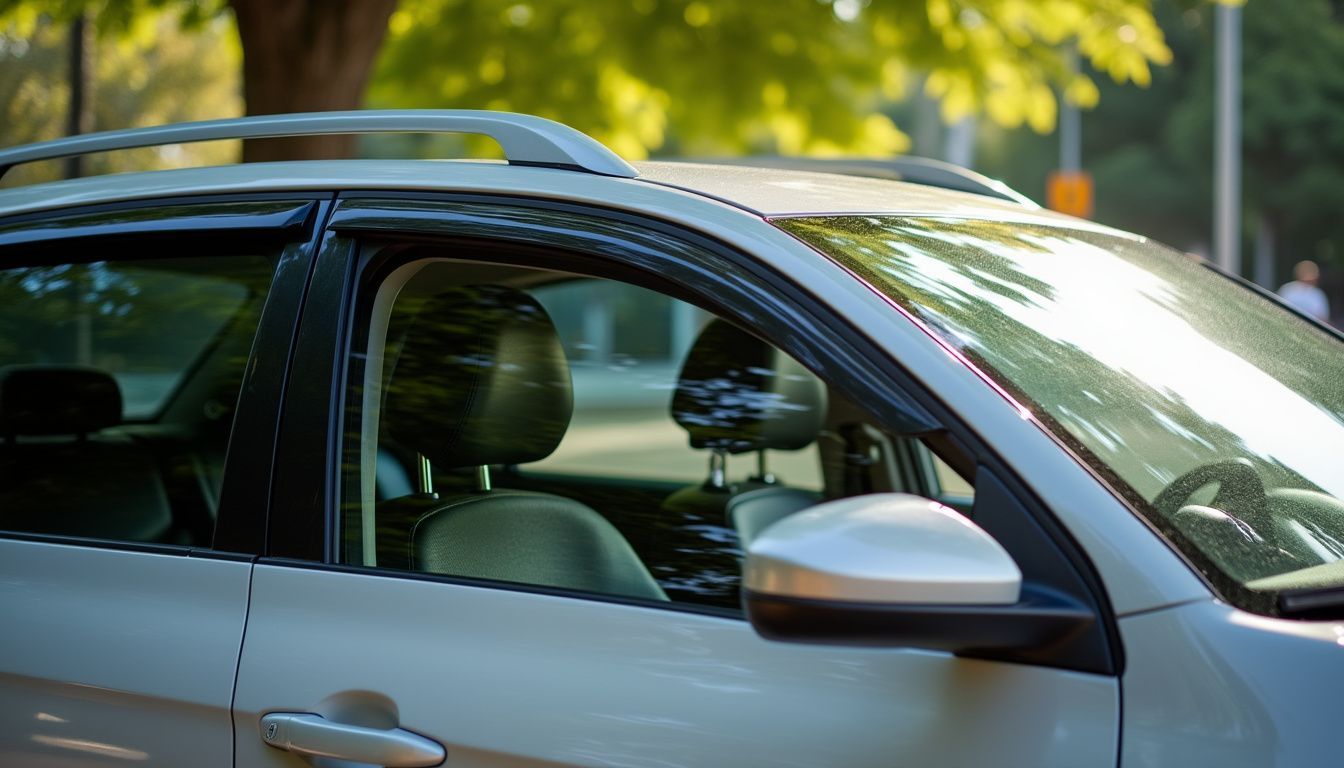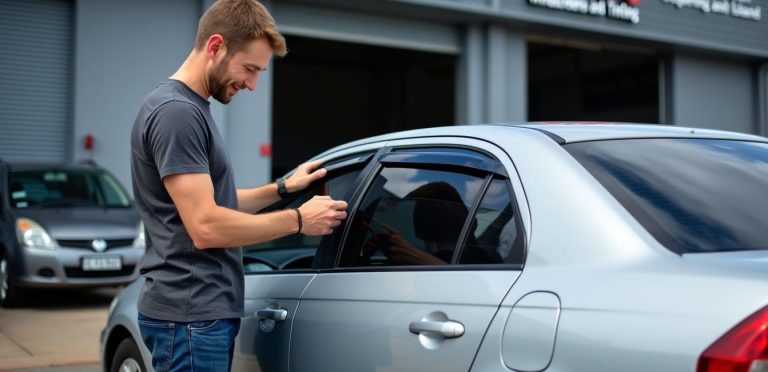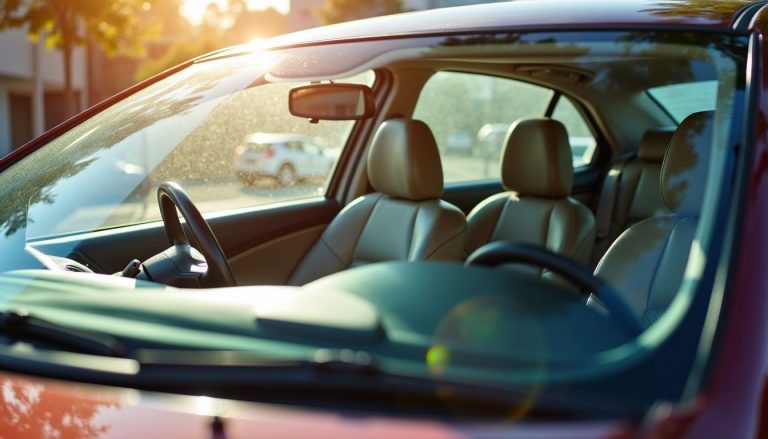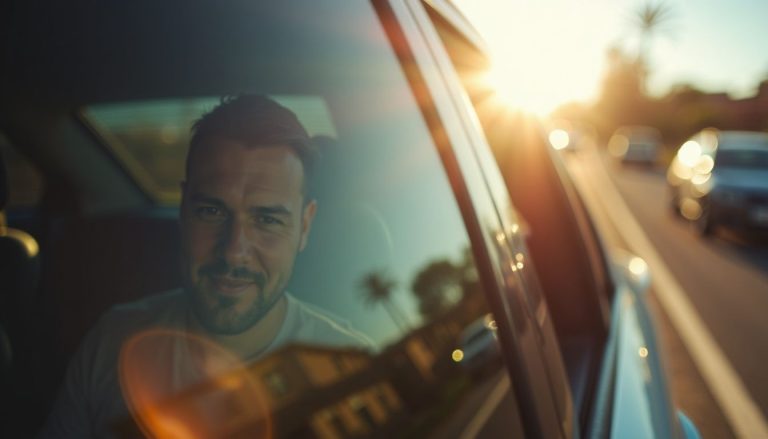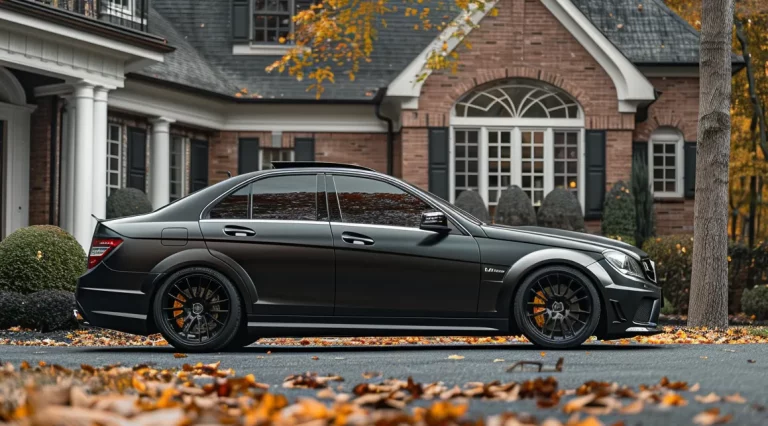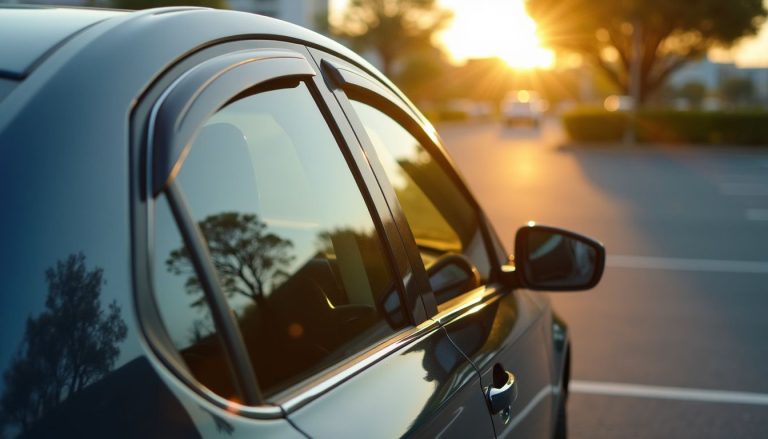How Car Window Tinting Enhances Privacy and Security for Cars
Car Window Tinting Enhances Privacy and Security
Car window tinting involves applying a special film on your vehicle’s windows. This slim layer does more than just enhance the aesthetic appeal of your car. It restricts the view of outsiders into your car, enhancing the privacy level internally.
Consider it as a pair of sunglasses for your vehicle; it guards against curious glances while also stopping up to 99% of harmful UV rays that can harm the skin.
This procedure not only provides increased protection from the sun’s glare and heat but also aids in concealing valuables from potential thieves peeping in. Given the variety of darkness options available, one can decide how much light penetrates and the privacy level desired.
Whether it is about maintaining the internal temperature or safeguarding oneself from unwanted attention, window tint provides an additional security layer and peace of mind with every journey.
How does car window tinting work?

So, we’ve talked about what car window tinting is. Now, let’s get into how it actually works. Tinting a car’s windows means putting a special film on them. This film makes the windows darker which keeps prying eyes from seeing inside your car.
It’s like sunglasses for your vehicle! The process involves cleaning the windows first to make sure no dirt gets trapped under the film. Then, a pro carefully applies the tint film onto each window.
The magic of this film isn’t just about making things look cool or private; it does more than that. It can block up to 99% of those harmful UV rays from the sun that could fade your car’s seats and dash.
Plus, it helps keep your ride cooler by rejecting heat. Think about driving on a hot day and feeling less like you’re in an oven—window tinting can help with that.
Tinted windows are not just for style; they’re like a shield against the sun and curious eyes.
What are the different types of window tints available?

Now that we know how car window tinting works, let’s explore the different types of tints you can choose for your ride. Each type offers its own benefits, from UV protection to enhancing your car’s look.
- Ceramic Car Window Tinting – This high-quality window tint is a top pick for drivers wanting the ultimate in heat reduction and UV protection. It uses advanced technology to keep your car cool and protect the interior.
- Octane Darkest Legal Tint – If you’re keen on keeping things as private as possible, this is the go. It’s the darkest tint allowed by law, offering an extra layer of privacy while still letting you see out.
- Black Panther Window Tint – Known for its durability, this tint gives your car a sleek look while adding a layer of security against prying eyes and sun damage.
- Classic Black tint (35% light transmittance) – A solid choice for reducing glare and keeping your car cooler. It’s not too dark but offers a good level of privacy and protection.
- Dark 20 tint (20% light transmittance) – This one takes privacy up a notch. It’s darker than the Classic Black, making it harder for others to see inside your car.
- Limo 5 tint (5% light transmittance) – As the name suggests, this is what limousines use. It provides maximum privacy and keeps your car looking pristine but make sure it’s legal in your area first!
Is car window tinting legal in my state?

Checking the legal side of getting your car windows tinted is a must. Every state has its own rules about how dark your tints can be. These are not just any rules—they make sure you stay within the law.
It’s all about the percentage of light that can pass through your tinted windows. States have set these percentages to ensure drivers have enough visibility, while also allowing for privacy and security.
To stay out of trouble, always look up your state’s specific regulations before deciding on window tinting for your car. Doing so keeps you safe from fines or penalties for breaking the law.
Yes, choosing the right darkness level and type of tint requires a bit of homework—if you don’t comply with local laws, it could cost you more than just money for removing the tint.
So, it’s smart to check first and tint later!
Why is Privacy Important When Driving?

Driving should be a safe and private time. Car window tinting helps make this true. It keeps people from seeing inside your car. This means less chance someone will try to steal something because they can’t see what’s inside.
Plus, if you’re like me and enjoy singing loudly to your favourite tunes without judgement, tinted windows keep those outside performances private.
Increased privacy on the road leads to a safer driving experience by reducing distractions.
Keeping prying eyes away also means personal information stays safe. In today’s world, leaving documents or gadgets in your car can lead to identity theft if seen by the wrong person.
Tinted windows act as a layer of protection against these risks, offering peace of mind while driving or when parked.
How does window tinting improve personal privacy while driving?

Window tinting provides a subtle layer of privacy to your car. Consider it as your car windows’ personal set of sunglasses. It decreases the visibility from the outside into your vehicle.
Thus, your drives can be devoid of unnecessary attention, and your possessions inside the car remain less visible to potential thieves.
Tint shades vary, with each allowing different light transmission levels. Some might be extremely dark, admitting little to no light, while others maintain your privacy while being lighter.
The choice of shading allows you to control your level of privacy, concealing your items and providing you comfort during your journeys.
In addition to that, window tinting reduces solar glare, enhancing your driving experience. With glare reduced, your vision improves, and the vehicle interior remains cool during sweltering weather conditions.
Therefore, window tinting provides not just heightened privacy and security but also contributes to a more enjoyable drive overall.
What are the risks of not having tinted windows for privacy?

So, we’ve just talked about how tinting can keep your drives private. Now let’s flip the script and see what happens if you skip on those tints. First off, not having tinted windows is like living in a glass house where everyone can see inside.
It means anyone walking by can have a peek at what’s inside your car. This could be a big deal if you’ve left anything valuable on the seat or dashboard. Turns out, thieves love window shopping too! And when they see something they fancy in your car, the risk of them breaking in shoots up.
Another downside is all that sunlight pouring in. We’re talking about some serious glare during drives and an oven-like feel inside your vehicle on hot days. Plus, this sunshine isn’t just making you sweat; it’s also fading your car seats and dash over time.
Oh, and let’s not forget – without that extra layer of protection from tints, you’re getting hit with UV rays which are no good for your skin either. So while it might seem alright to save a few bucks skipping on window tinting services now, think of what it could cost you later – from replacing stolen items to dealing with sun damage both on your skin and car interior.
Can window tinting protect against harassment or unwanted attention?

Car window tinting does a great job at increasing privacy for people inside the car. This makes it hard for others to see who’s inside or what they have in their car. It’s like having an extra layer of security that keeps you less visible when you’re out and about.
Plus, with the darkest legal tints on your windows, folks outside can’t peek in easily. This means staying under the radar and away from unwanted stares or attention.
Enhanced privacy through tinted windows helps individuals feel more secure and less vulnerable to harassment while in their vehicle.
This kind of peace of mind is priceless, especially when parked in busy spots or driving solo at night. Investing in high-quality window tints provides protection against nosy eyes trying to get a view inside your car.
So, if keeping a low profile and protecting your personal space is what you’re after, fitting your ride with some sleek tints might just be the smart move.
How Does Window Tinting Enhance Security?

Window tinting adds an extra layer of protection for your car. It makes it more difficult for potential thieves to see inside your vehicle, particularly if you opt for the darkest legal tint options.
This reduced visibility can safeguard valuable items left in the car and enhance personal privacy while driving.
Additionally, window tinting not only adds a layer of privacy but also enhances safety during collisions. It achieves this by holding shattered glass together, reducing the risk of injury from broken glass shards.
So, apart from enhancing privacy, window tinting provides tangible security benefits that are crucial for any car owner.
In conclusion, investing in professional window tinting services not only adds to the visual appeal of your vehicle but also enhances its security measures. With these significant advantages combined with the increased sense of privacy and comfort provided by window tints; selecting suitable tints is essential – one that balances both legal compliance and functional requirements to ensure your peace of mind on the road.
Certainly, let’s delve into how window tinting can improve comfort during hot weather.
What role does window tinting play in deterring theft?

Transitioning from discussing the security enhancements of window tinting, it’s essential to consider its impact on deterring theft. Window tinting significantly contributes to reducing the risk of theft by making it harder for potential thieves to see inside vehicles and identify any valuable items.
This obscurity adds an extra layer of protection as it deters opportunistic theft and reduces time spent parked in vulnerable areas due to minimised interior glare and heat. Furthermore, darker legal tint options enhance concealment of items, providing added security against unwanted attention.
Incorporating a suitable level of window tint also ensures protection against UV rays, preserving the vehicle’s interior condition while simultaneously reducing its appeal to potential thieves.
These factors collectively establish window tinting as a smart investment for enhancing both personal privacy and deterring theft.
Can tinted windows help protect valuables inside the car?
Tinted windows on a car can greatly enhance the security of your belongings. They provide privacy and make it challenging for outsiders to see inside the vehicle. The tinting ensures privacy and deters potential thieves from surveying your possessions.
Darker tints, such as Dark 20 and Limo 5, significantly reduce visibility into the car, providing an additional layer of security. This not only safeguards your belongings but also discourages theft.
Car window tinting offers customers a range of darkness options to meet their security requirements. It is advisable to choose a darkness level that guarantees both privacy and enhanced security for protecting valuables while on the move.
How does window tinting affect visibility for potential thieves?
Window tinting enhances security by reducing visibility for potential thieves. Darker tints like Dark 20 and Limo 5 significantly decrease what can be seen inside, making it more difficult to spot valuables.
This makes it less likely for thefts to occur as the interior of the car is concealed. Professional installation ensures that the darkness level is consistent, further improving security.
Various tint options give car owners control over how much light comes through, providing optimal privacy and security. Thieves find it challenging to assess what’s inside a vehicle with tinted windows, deterring them from attempting thefts.
Moreover, the uniform darkness achieved by professional installation prevents potential thieves from identifying valuable items or individuals inside the car easily.
Tinted windows serve as an added layer of protection against opportunistic crimes by obstructing visibility into the vehicle’s interior. This benefit contributes significantly to enhancing overall security measures for cars.
What are the Benefits of Window Tinting Beyond Privacy and Security?
Window tinting offers more than just privacy and security benefits. It also helps in making the car cooler and reducing heat, providing protection against harmful UV rays that can damage skin and interior surfaces.
Moreover, it reduces glare, improving visibility while driving, which is crucial for safe navigation on the road. The darkness of the window tints adds an extra layer of privacy, ensuring personal comfort.
Moreover, investing in car window tinting enhances the appearance of your vehicle by preventing interior fading caused by UV rays. It also offers decorative options to personalise the aesthetic of your car.
Additionally, window tinting provides increased security by deterring theft and offering an added layer of safety during collisions by holding shattered glass together.
The benefits are not limited to privacy and security alone – they encompass improved comfort during hot weather, reduced UV exposure for better skin protection, enhanced driving visibility through reduced glare, and preservation of the interior aesthetic through minimised fading caused by sunlight exposure.
Moving forward with discovering how to choose the right window tint for your car…
How can window tinting improve comfort during hot weather?
Moving from the benefits of window tinting to enhancing comfort during hot weather, it’s important to highlight that window tinting offers an effective solution. To start, it notably reduces heat inside the vehicle, making the conditions more comfortable in extreme temperatures.
Furthermore, it reduces glare from sunlight, making driving more pleasant and lessening eye strain. Additionally, by providing 99% UV protection, tints shield against skin damage and prevent interior fading caused by harmful rays.
All these factors work together to improve overall comfort inside the car during hot weather without compromising visibility or safety.
For better audience comprehension and simplicity, including statistical data or examples related to the extent of heat reduction achieved through tinted windows and other tangible impacts on comfort during hot weather would be beneficial.
What impact does window tinting have on UV exposure and skin protection?
When window tinting is used, it provides 99% UV protection, significantly reducing the harmful effects of ultraviolet rays exposure inside vehicles. This action helps in preventing skin damage caused by UV radiation.
It contributes to better skin health for passengers. Tinted windows also play a crucial role in minimising interior fading caused by UV rays, preserving the vehicle’s interior aesthetics.
For further enhancement of heat rejection and overall comfort and protection from UV exposure, the use of ceramic tints such as Spectre Ceramic Tint is recommended. Moreover, the darkest legal tint options provide additional protection against both UV exposure and unwanted visibility into the vehicle.
The impact on UV exposure and skin protection that window tinting offers is significant in safeguarding individuals travelling in vehicles from potential harms related to excessive exposure to ultraviolet rays.
Can window tinting reduce glare and improve driving visibility?
Window tinting can significantly reduce sun glare, enhancing visibility while driving. By decreasing the sunlight that enters the car, window tinting can also enhance clarity and safety when driving under various light conditions.
It’s like equipping your car with sunglasses: it helps maintain clarity and minimises the harshness of bright light. This translates to a more comfortable and safer driving experience for both you and your passengers.
The reduction in glare isn’t just about comfort; it’s also a safety enhancement. Clear visibility is essential whilst driving, so anything that improves it is a valuable addition to your vehicle.
This applies not only during sunny days but also when contending with headlights at night or reflections from wet surfaces after rain.
When selecting window tint, consider the level of glare reduction required based on your regular driving environment – whether it’s through open countryside or navigating bustling city streets.
How to Choose the Right Window Tint for Your Car?
Choosing the right window tint for your car is essential to enhance privacy, security, and comfort while driving. Here are the key considerations:
- Look for tints that offer varying levels of obscurity like Dark 20 and Limo 5 to cater to your desired privacy needs.
- Ensure compliance with legal regulations by checking light transmission percentages, e.g., Classic 35, ideal for front windows.
- Consider security features; darker tints can help conceal valuables, reducing theft risk.
- Seek tints with UV protection; 99% UV-blocking tints can protect skin and prevent interior damage.
- Research different tint types such as Spectre Ceramic Tint and Octane Darkest Legal Tint for unique advantages.
- Take advantage of mobile tinting services and exclusive discounts offered by reliable providers like RACQ for convenience and quality assurance.
These considerations will help you choose the most suitable window tint for your car, ensuring enhanced privacy, security, and comfort while driving.
What factors should you consider when selecting window tint?
When choosing the right window tint for your car, consider these factors:
- Level of Privacy: Evaluate different tint options like Classic 35, Dark 20, Limo 5 to ensure it provides the privacy you need.
- UV Protection: Look for tints offering up to 99% UV rejection to keep you and your interior safe from harmful rays.
- Heat Rejection: Assess the heat rejection capabilities of tints such as Nano-Ceramic Heatshield with up to 60% TSER to keep your car cool during hot weather.
- Warranty and Aftercare: Choose tints with lifetime warranties and aftercare instructions for long-term benefits and protection.
- Security Enhancement: Select tints that reduce visibility into the vehicle, enhancing security and deterring theft.
- Aesthetic Appeal: Consider decorative options available to ensure the tint complements the appearance of your car.
How can you ensure you comply with local laws when choosing a tint?
To make sure you follow the rules when picking a tint for your car, first check the visible light transmittance (VLT) levels. Different tints have different VLT, and local laws specify how much light can come through.
Classic 35 is the darkest legal tint for front windows, while Dark 20 is allowed for rear windows to provide more privacy. Limo 5 offers extreme privacy but limits visibility and should be used cautiously.
Combining lighter tints on front windows with darker tints on the rear can ensure compliance with local regulations so that your car stays within legal limits. Make sure to verify the legality of your chosen tint in your state or territory before installing it to stay lawful.
Should you hire a professional or try DIY window tinting?
Opting between hiring a professional or attempting DIY window tinting can be a significant decision. Professional services offer superior heat rejection, UV protection, and enhanced security.
They also provide lifetime warranties on workmanship and access to advanced materials like Nano-Ceramic films, which enhance privacy for passengers and belongings. Conversely, while DIY options may initially appear cost-effective, they often lack the quality and durability provided by professionals, increasing the risk of bubbles or peeling during application.
Additionally, professional installation significantly reduces these risks due to experienced technicians who provide tailored advice and options to meet specific customer needs. While it might be tempting to choose DIY window tinting as a budget-friendly option at first glance, considering the long-term benefits of professional service is essential in ensuring the best results in terms of heat reduction maintenance as well as personal safety.
What are the Maintenance and Care Tips for Tinted Windows?
To keep your tinted windows looking great and functioning effectively, follow these maintenance tips:
- Use a microfiber cloth and plain water to clean the tinted windows – avoid using ammonia-based cleaners that can damage the film.
- Wait for at least four days after installation before cleaning to prevent disturbing the uncured film.
- Keep windows closed for two days after installation to allow the tint to cure properly and avoid film catching on seals.
- Be mindful of a hazy or wet appearance that may persist for up to two weeks as the slip solution dries post-installation.
How should you clean tinted windows without damaging the film?
To clean tinted windows without damaging the film, it’s important to wait for at least four days after the installation before cleaning them. Use a microfibre cloth and plain water for cleaning.
Avoid using any ammonia-based or abrasive cleaners that can harm the film. It’s essential to keep the windows closed for two days immediately following installation, as uncured film catching on seals can cause damage.
Finally, expect a hazy or wet appearance on the window surface for up to two weeks as the slip solution dries.
Cleaning tinted windows without causing damage involves waiting after installation, using gentle materials like microfibre cloth and plain water, avoiding harsh cleaners, keeping windows closed initially, and being patient with any temporary changes in appearance.
What are the common issues with window tints, and how can you prevent them?
Window tints commonly face issues like bubbling, peeling, and color fading over time. To prevent bubbling, ensure proper installation and let the film cure fully. Prevent peeling by following aftercare instructions, such as keeping windows closed for two days post-installation. Choose high-quality films with UV protection to avoid color fading. Clean regularly with a microfiber cloth and plain water to maintain the tint’s appearance. Look for lifetime warranty on workmanship for reassurance against common tinting issues. Darker tints enhance privacy and security by reducing visibility into the vehicle.
How long does window tinting generally last, and when should you consider reapplication?
Car window tinting usually lasts for a few years, influenced by the quality of the film and the environment. Signs like peeling, bubbling, or color change may mean you should reapply it.
Quality tints such as Spectre Ceramic Tint are more durable. The installation’s quality is essential—lifetime warranty means reliable workmanship can affect how long they last.
Regular maintenance can extend their life; cleaning properly and avoiding harsh chemicals help. Window tints provide significant UV protection too; protecting against skin damage and interior fading.
They also improve driver safety by reducing sunlight glare.
Consider reapplication if your window tint shows signs of wear or damage to keep enjoying its benefits.
FAQs
1. What is car window tinting and how does it enhance privacy?
Car window tinting involves the application of a thin film on your car windows. This not only provides an added layer of privacy by darkening the inside view of your car, but also enhances personal security.
2. How does car window tinting improve my vehicle’s security?
By keeping the inside of your car less visible from outside, window tint creates an added layer of security. It makes it harder for anyone to see what’s left inside the car, reducing potential theft risks!
3. Can window tint help keep my car cooler?
Absolutely! One benefit often overlooked is that a good quality ceramic or other type of window film can reduce heat entering through windows, helping keep your ride cool even in Australia’s scorching summers.
4. Will getting my windows tinted protect my interior?
Yes mate! Tinted windows provide protection against harmful UV rays which can fade and damage the interior of your vehicle over time.
5. Are there any laws regarding how dark I can have my tints?
Indeed there are “tint laws” governing darkness levels for safety reasons – you wouldn’t want to be peering out into pitch black at night now would ya? So ensure you’re aware before going full blackout mode!
6. Should I install tints myself or hire professionals?
While DIY might seem tempting, professional services ensure proper installation with fewer bubbles and creases plus they know all about those pesky ‘tint laws’. Discover all these benefits when you go pro with your next car window tint job!

